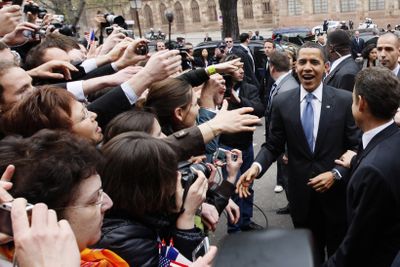Obama in France for NATO summit
President seeks support for Afghan war

STRASBOURG, France – In a variation on his unfolding message to Europe, President Barack Obama said Friday that the United States has at times displayed arrogance but appealed to Europeans to set aside their own “insidious” anti-American biases in favor of trans-Atlantic friendship.
Still, as leaders of NATO gathered for today’s summit marking the 60th anniversary of the alliance, Obama’s campaign did not seem to be producing the concrete results the president sought – in particular, new pledges for help in Afghanistan.
French President Nicolas Sarkozy and German Chancellor Angela Merkel, who together are hosting the summit along the border between their countries, expressed support Friday for the Obama administration’s new strategy of sending extra American troops and strengthening Afghan forces. But they offered no new troops of their own.
Obama arrived in Strasbourg from the Group of 20 summit in London, which focused on the global economic crisis. The NATO summit could be more difficult for Obama, in part because of Afghanistan. But other touchy issues include strains over the future of the alliance in the face of growing Russian irritation. And members this week confronted differences over a new NATO leader.
Turkish officials object to the selection of Danish Prime Minister Anders Fogh Rasmussen, who spoke out in favor of the press freedoms after a Danish newspaper in 2006 published cartoons of the Prophet Muhammad, enraging Muslims.
Throughout his European tour so far, Obama has employed a strategy well-honed at home: interspersing high-level meetings with pep rallies catering directly to their bases of support.
On Friday, the president held a town hall meeting in a local sports arena, where hundreds of screaming teenagers filled the room and lavished Obama with public displays of approval. Broadcast images could easily be seen by the NATO summit hosts.
In the United States, Obama told the crowd, there has been a failure to appreciate the “leading role” Europe plays in the world.
“Instead of celebrating your dynamic union and seeking to partner with you to meet common challenges, there have been times where America has shown arrogance and been dismissive, even derisive,” he said.
But Obama did not lay all the blame on U.S. attitudes.
“In Europe, there is an anti-Americanism that is at once casual but can also be insidious,” he said. “Instead of recognizing the good that America so often does in the world, there have been times where Europeans choose to blame America for much of what’s bad.”
Such attitudes are unwise and untrue, he said.
“They fail to acknowledge the fundamental truth that America cannot confront the challenges of this century alone, but that Europe cannot confront them without America,” he said.
It was a new twist on the conciliatory approach Obama has taken over the past four days as he travels through Europe. The Obama strategy is powered in part by the popularity of the new American first couple, evident in the meetings with world leaders and in interactions with the public.
The Obamas were greeted like celebrities when they arrived in this city in the Alsace-Lorraine region. When they joined Sarkozy and his wife, Carla Bruni, at the Palais Rohan, they were thronged by crowds who waved, calling out to them and taking pictures.
Obama’s job of finding extra help from NATO allies for Afghanistan was complicated by news that Afghanistan is in the process of enacting a law on marriage that human rights advocates contend would allow a husband to rape his wife. The law, which has yet to take effect, applies to the country’s Shiite minority.
NATO Secretary General Jaap de Hoop Scheffer said that actions which Europeans find revolting make NATO’s involvement more difficult.